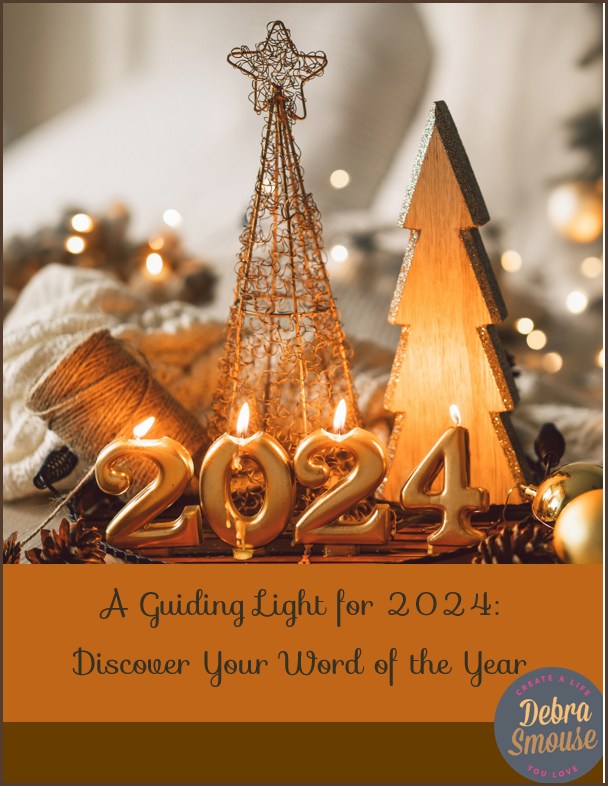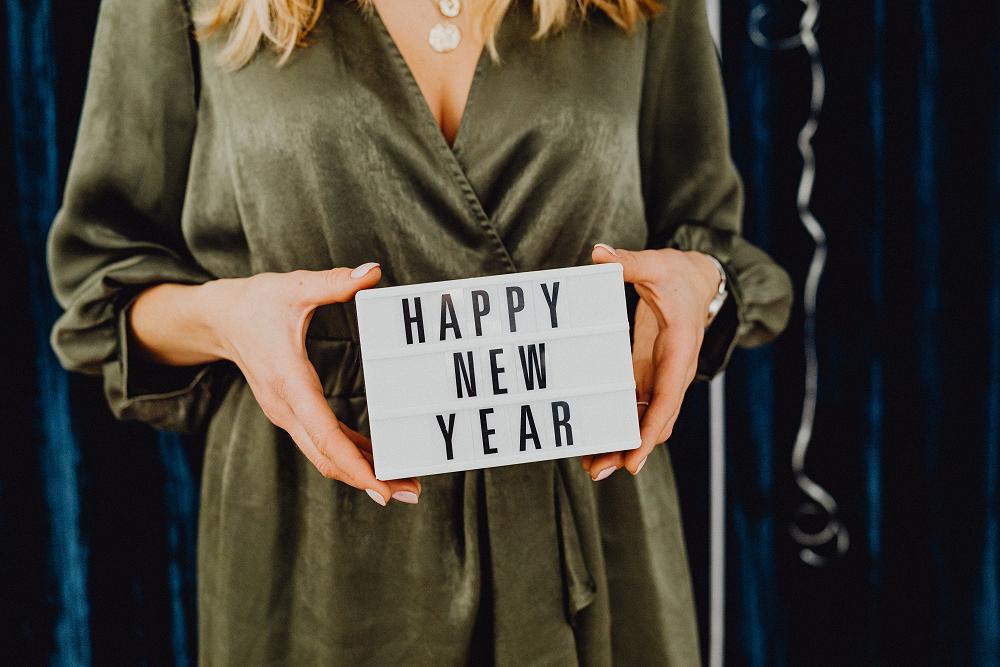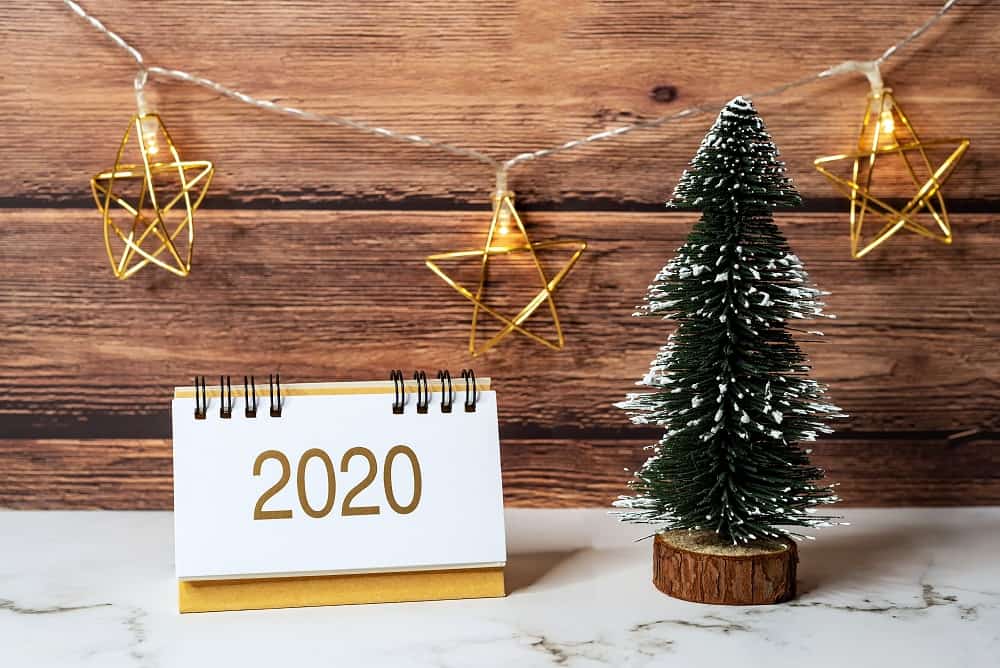Welcoming a New Year has long been synonymous with fresh starts and the idea of making resolutions to Make Your Life Better. I haven’t made New Year’s Resolutions in over a decade. Yet I get the appeal to them! For a brief moment, you are looking at the kind of life you desire to create. When you make resolutions, you are imagining what it would be like to love your life and the image you see looking in the mirror.
Despite the fact that they can be cliché, I love the idea behind resolutions.
But one of the reasons I no longer make them is that the language behind the word is harsh: resolve to change. Force yourself to Do Better. Be more disciplined so that you can be skinny/in shape/richer/ happier/etc.
Semantics aside, though, what gets in the way of resolutions working is that they are typically done from a perspective of fixing what is broken in your life. And frankly, let’s be clear: no one is broken. You are not a tea cup that has been dropped and in need of being repair.
Instead of emerging organically from self-awareness or self-analysis, resolutions often come after imagining a radically different – and often greater – level of perfection in one or all of the areas in your life.
I prefer to find my way to love, which is why I am a big fan of setting an intention with a Word of the Year. And, because I know it takes action to move your desires into reality, it’s why I’m also a big fan of goal setting.
Just for a moment, though, let’s go back to semantics. It’s easy to say that the following words carry the same meaning: resolutions, intentions, goals, and plans. In a broad sense, these words can be interchanged in some conversations for the sake of getting to the heart of the matter, right? Yet because our human brain associates a negative or positive connotation to individual words, those semantics matter.
For me, making resolutions my focus feels harsh, but setting goals feels actionable and doable. For others, maybe goals sound too structured and rigid, but the idea of intentions feels lush and open. I know for a fact that the word “plan” gets under the skin of dozens of dear friends because (a) plans seem rigid and (b) plans “never work out” so why bother?
What I do love about the New Year and the idea behind setting resolutions, truly, is that you are choosing to reflect on the quality of your life.
Humans are made to stretch and grow, and reflection allows you to choose what areas of your life you wish to expand and where you just might need to shake things up. Plus, there’s this invisible, electric energy in the air everywhere you turn. For some, just the energy of “everyone else” making resolutions gives just the right amount of push to get motivated and take advantage of the momentum of the world around us.
Though resolutions (and goals) are very personal, we have to remember that we are not alone on this planet and that getting inspiration or energy from others helps fuel us and move us towards success. So, if you want to love your life more, this is the perfect time of year to take the plunge.
That said, I don’t believe that there is a special magic associated with making resolutions or setting a goal on January 1st that makes it any more successful or doable than if you did it say, today, or next week, or on your next birthday.
So, if I’m averse to making resolutions because of that harsh tone that rolls around in my head, exactly how do I set those intentions and goals I mentioned?
Here’s how I channel the idea behind resolutions. Pick and choose any of these that work for you!
First, I begin my planning for the year by choosing a word to serve as my intention.
I’ve followed the practice of intention-setting with a Word of the Year for more than a dozen years now, and the reason the process works for me is that it sets a tone, a theme, a sacred contract between my soul and the universe as to what I wish to learn and how I desire my world to unfold in the coming year.
A running list of desires is kept.
I keep this list in my Bullet Journal. I refer to it often and I add to it often. This is a running list of stuff I want to do and things I wish to buy and experiences I want to have. Write a new book. Maybe a new wallet. Would love to have more energy. I want to have more stamina. Streamline my kitchen. I want to take a beach vacation. Travel with John more this year.
Examine the body of work I want to create.
I want to have on paper (or in a spreadsheet) what work demands of my time and my energy in the coming year. You may not be a writer or an artist, so the phrase “body of work” may not fit you, however, I challenge you to look at your chosen career or the soul work you desire to do and apply this concept to your life. Consider what you wish to achieve over the year, and what you must do to succeed.
For example, I know that I need to create twenty-six posts for this blog as well as a bi-weekly newsletter for subscribers. I know that I want to gift subscribers with at least three free books throughout the year. I know that I need to create twelve Become Besotted workbooks per year. I know that I need to write a monthly column for Modern Creative Life. These are non-negotiable commitments.
These grow my body of work, however, they do not expand my body of work. To expand my body of work, want to write two new books before the next year rolls around. For you, the goals may be different – maybe you want to bring in three new clients every month, or host at least twelve open houses by the end of December.
Examine the quality of my daily life
What’s working and what isn’t working? Are there changes I wish to make? Am I wishing for more of anything? What might I need to do less of? How do I desire to feel in my body? How can I improve the quality of my daily life with JB? What relationships do I want to grow? What relationships aren’t working?
Imagine an Ideal Day
Going back to the Perfectly Imperfect Day activity allows me to get real with what I desire, what my current reality is, and what I need to do in order to feel more joy about the daily experience of living. This is where we must look reality in the eye. For example, if I imagine eating better meals to reduce inflammation in my joints, part of my ideal day is going to involve spending time in the kitchen cooking.
Imagining your ideal day allows you to make concessions for the activities and time needed to ensure that what you want in your life has the attention it needs to flourish.
I begin to set goals.
It’s been shown that most of us humans really can’t multitask, and through experience I know that trying to fix “everything” never works. So, I set no more than three big goals. This means I have to prioritize what’s really important to me. It also means that I have to decide where I’m going to sacrifice in order to make space to bring a goal into the reality of my future.
Sacrifice is a part of the human experience because no matter what the perfume ads may tout, you can’t achieve it all right this moment. When you set goals, you have to decide which of your dreams is going to get the lion’s share of the attention now and which desires must be set aside. This allows you to better focus on and achieve your goals.
It’s also the time to ensure my goals don’t conflict with each other.
After I set goals, I make plans.
How am I going to take each goal and make them happen? I write down my goals and set some general deadlines. Then I begin breaking those goals down in steps.
I have to ask myself: how much time per week or per day do I need to put towards this goal? Because I have a plan with outlined steps to take, it means I don’t have to figure out what’s next on any particular day. And let me say this about plans: even if you have to adjust a plan, having one and adjusting it is easier than flying by the seat of your pants. Even if I don’t achieve my goal by my own deadline, I know what it will take to reach my goal.
I look at the calendar and choose some milestone dates.
For example: I want to write two new books this year. If I want to publish the first book in May, I need to have a draft completed and in the hands of an editor no later than March 31st. By plotting the milestone dates, I then look at the amount of time it will take to make sure I hit the milestones.
I also need to be willing to take the first step as soon as possible. This allows me to gain momentum and sets me up for success.
Ultimately, whether we make resolutions, or set intentions and choose goals, we are making the choice to change.
For me, small changes that add up are more likely to ‘stick’ than the big changes we envision when we make those New Year’s Resolutions, but whatever language you choose to use, remember that you are not in a race, and life is not a competition. If a goal you set in January no longer feels appropriate when the calendar page flips to March, take the time to revise your goals, rather than judging yourself unfairly.
You deserve to experience the kind of life you desire and bring you dreams into reality. Be willing to set semantics aside, use the concept behind resolutions, and take the actions you need to create a life you love.
Would you like a guide to help you choose a word of the year for your 2022 Touchstone?
A Guiding Light for 2024: Discover Your Word of the Year.
 Here’s what you’ll find in A Guiding Light for 2024: Discover Your Word of the Year.
Here’s what you’ll find in A Guiding Light for 2024: Discover Your Word of the Year.
-
- In Part One, you’ll take a look back as you Bid Farewell to 2023.
- You’re invited to look ahead to 2024and begin to breathe life into your desires as you explore Part Two.
- In Part Three, you’ll review a list of more than 1000 words and begin pondering what Word (or words) is right for YOU in 2024.
- To help you gain clarity, Part Four provides you with a series of tools to help you gain clarity around the best Word to serve as a touchstone to serve as your companion through your journey in 2024.
- In Part Five, you’ll Declare Your Word (or Words) of 2024.
I’ve also added two Bonus section to help you you create a more nourishing year.
Bonus One explores Ways to Work with Your Word of the Year. This section suggests a dozen ways to help seal your Word…and more than a dozen journal prompts to continue to check-in with your Word throughout 2024.
Bonus Two is an invitation to dive into your emotions. There, I’ll share how you can use your emotions for good. And as a path and process for creating days that are more nourished. And satisfying.
Get your FREE Copy of this powerful workbook: A Guiding Light for 2024: Discover Your Word of the Year.









